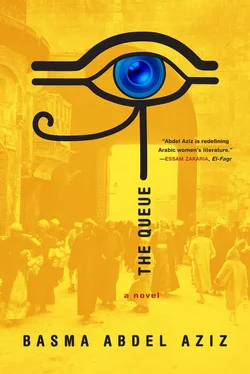Over the weeks that followed, Um Mabrouk gradually moved up the queue by providing all sorts of key services. She cleaned people’s things, played with their children, did their grocery shopping, and sometimes even washed their clothes. She finally settled near Ines in a place to her liking and had no problems mixing with everyone else. She resumed her normal activities, but soon became more interested in the rumors and scattered bits of news she heard now and then. One day, she declared that the insect infestation people were discussing was just “nifs” and had nothing to do with how clean the place was. Ines asked her what she meant, and she explained that the insects were a result of the evil eye: other people outside the queue clearly had ill will toward everyone gathered in front of the Gate. People kept arriving at the queue, and the numbers continued to rise, so much so that they would soon block out the sun. But despite how crowded it was, the people in the queue lived their lives and solved their own problems without help from anyone. This was exactly what made people outside the queue fear and envy them, and what set their schemes in motion. They didn’t want the people in the queue to be a united collective or “one hand.” Um Mabrouk added that such things often happened in the alley where she lived; people everywhere needed to keep jealousy and the evil eye at bay. Ines said nothing, but Shalaby — whose arrogance had not diminished since his arrival — confidently agreed with her.
It didn’t take long for Shalaby to creep into their conversation, gradually at first, with a few well-placed comments. Then, when neither Um Mabrouk nor Ines objected, he picked up the thread of the discussion and refused to let go. He seemed to have been waiting for an opportunity to enter the tight cliques that had formed among veterans of the queue. These were difficult to penetrate, so newcomers created their own circles of camaraderie. Shalaby hadn’t been able to join a single one of those, either, though not for lack of effort.
With Um Mabrouk and Ines he found a new beginning, a way to announce his presence and loosen his tongue, which had nearly stuck to the roof of his mouth because of how long he’d gone without talking. His mother used incense to ward off the evil eye, he began, though he himself preferred to read the incantations he’d memorized as a five-year-old, when his father sat him and his cousin Mahfouz down to teach them everything they needed to know about life. He eagerly preempted any questions: no, he personally had no need for the Gate; it was Mahfouz, God rest his soul, who was the reason he’d come here from his village, though he’d sworn to himself he would never leave it again. He’d finished his service a couple of months back, and gone home to his village to settle down and raise a family in his father’s house, and to begin to deal with the land issues that had multiplied in his absence.
He and Mahfouz were around the same age; they’d been raised together, had fallen sick with measles together, and had left elementary school together to work in the fields. That was until all the farmable land around their village dried up and the landowner began to quarrel with their families over the few meager acres they leased and lived off. So he and Mahfouz started shift work at Fino Bakery instead, then worked as plumbers, installing shower pipes, and finally were conscripted when they both came of age. Shalaby was selected to be a guard in the Servant Force, assigned to protect the wife and children of a Middle Sector Commander, and thus relieved from more difficult duties, while Mahfouz was chosen for the Quell Force. It was Mahfouz’s sworn duty to protect and defend the country from Godless infidels, unscrupulous rebels, and other filth who were bent on destruction and had an insatiable appetite for dirty money.
Mahfouz never dawdled when given an order, and because of his massive frame, the Commander positioned him in the advance guard. In every clash and battle, he stood there, an impregnable fortress, and not once did anyone break through the wall that was Mahfouz’s solid body. These were the stories his fellow guards told, but they also said he was dutiful and kind; he never quarreled or complained, he sang the Commander’s praises day and night, and his only response to orders was “Yessir.” He cleaned the army vehicles, cooked meals in the mess hall, and fixed the electricity: he knew why it cut out and how to repair it, thanks to his early years in the village. He advanced when given the command, struck as soon as he heard the signal, and never paid heed to rumors. He was a model member of the security forces and thoroughly dependable.
Shalaby carried on boasting about his cousin, extolling his merits and telling tales of his heroism, unaware of Ines’s growing restlessness and Um Mabrouk’s expression, which swung between envious admiration and cautious disbelief. Finally, Shalaby’s eyes filled with sadness as he gazed at the ground and said: But Mahfouz died. His truncheon crashed down on a filthy rioter’s damn head, but the stubborn scum kept trying to get up so Mahfouz shot him. His blood gushed out and stained the square, and his soul left his body right there. The man’s friends chased Mahfouz for ages and none of his fellow guards could help him, because the battle had gotten so chaotic. They surrounded him on the bridge, there were so many of them and he was all alone, so he jumped into the water, afraid they would catch him, and drowned.
Mahfouz’s name didn’t appear on the list of Righteous Guards released by the Gate; but he must have been omitted accidentally, because his superiors and Commander certainly recognized him as a hero. Shalaby proudly announced that he’d come to request honorable recognition for Mahfouz, and a Special Pension Permit for the grieving family who should be appropriately compensated, with, for example, a contract giving them the land the owner was threatening to evict them from. Shalaby fell silent for a moment, then declared that his cousin deserved to be named a war hero — no, a martyr! — which was also what the man he’d killed deserved to be called.
Yet amid his tales, Shalaby didn’t mention — because of respect for the dead, his own reserve, and the idyllic image he had proudly painted — that Mahfouz had made a mistake or two. The last time was when the world turned upside down and he was tasked with guarding a hospital. Mahfouz said he’d struck a deal with a patient suffering from a bad liver to spend the night with her. But then she screamed out in fear, and when the doctors and nurses on duty arrived to find him at the edge of her bed, about to take his clothes off, they grabbed him and dragged him outside. He fought back, saying she wanted him, saying she was the one who called to him from a window in the empty ward, and when they couldn’t calm him down they tied him up and informed his unit. That was where the Commander found him — bound with rope in the medicine storeroom. Shalaby also didn’t tell Ines or Um Mabrouk what happened next: that the Commander ordered Mahfouz to strip off his clothes and stand naked as the day he was born, while he blasted him with a hose and beat him with shoes and whips for disobeying orders.
He was supposed to have followed the orders he’d received before mobilizing toward the hospital, orders to stand on the mark the Commander had drawn on the ground, just like his fellow guards, and keep a safe distance from the sick ward. They told him not to abandon his post, under any circumstances, for any reason, but his lust for this woman had overpowered him. He was young, after all, and these things happen. Mahfouz was spotted later that day with his head hanging low, his bushy beard brushing against the hair on his chest. He groveled at his Commander’s feet, saying again and again: “Do what you want with me, ya basha , I’ll obey, sir, I swear.” But Mahfouz was mahzouz —lucky — that it didn’t go to trial and he wasn’t summoned to the Gate. The woman wanted to protect her reputation, and in the end she didn’t submit an official statement. Shalaby smiled, remembering that just a week after this incident Mahfouz survived that horrible accident, when their transport vehicle caught on fire and eleven of his fellow guards died. And then when the barracks collapsed with everyone inside, Mahfouz had emerged from the building without a scratch. But luck had betrayed him that final time during the Events, and now he lay like a stone at the bottom of the river.
Читать дальше











